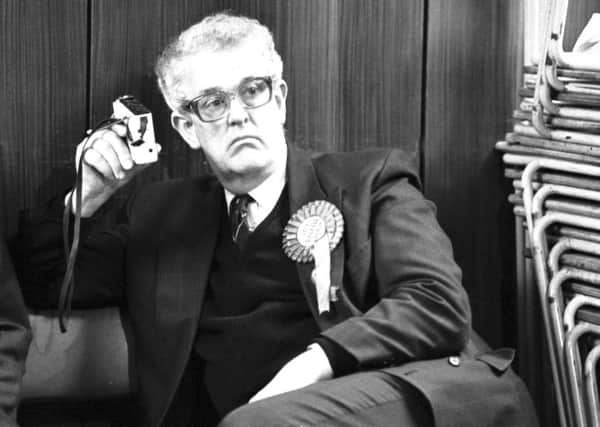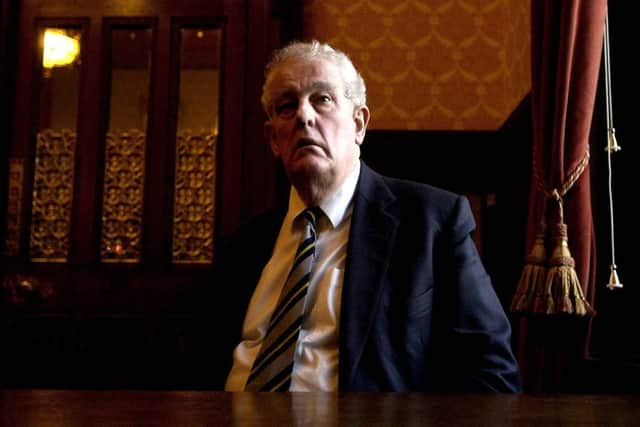Obituary: Tam Dalyell, maverick Labour MP


Tam Dalyell, politician. Born: Edinburgh, 9 August ,1932. Died: 26 January, 2017, aged 84.
With Thatcher, it was the sinking of the Argentinian cruiser General Belgrano during the Falklands War in 1982 which drew Dalyell’s fire and brought him to national attention. An event celebrated as a great strategic victory in the UK, Dalyell’s contention was that the Prime Minister had ordered the sinking of the ship to ensure an American-negotiated truce over the Falklands wouldn’t happen.
Advertisement
Hide AdAdvertisement
Hide AdAlthough he never managed to prove the claim, his repeated onslaughts upon Thatcher in the Commons – he was thrown out by the Speaker five times, branding the Prime Minister a liar and refusing to withdraw the remark – imprinted the idea upon the public imagination.


In a wider sense, they also identified Dalyell as a tenacious and uncompromising Labour voice at a time when the Tories were very much in the ascendant. Indeed, in 1982 he left the role he had held for two years as Labour’s frontbench science spokesman in protest at the party’s support for action in the Falklands.
Two decades later, Dalyell turned his aim upon the leader of his own party, this time ahead of Blair’s decision to take the country to war in Iraq in 2003. Although he was the Father of the House – the oldest member of the House of Commons, a venerable position – between 2001 and his retirement in 2005, Dalyell was asked to leave the House again in 2003 by the Speaker for refusing to sit while demanding a debate on Iraq.
“Fiercely independent, Tam’s persistence in pursuing causes close to his heart is legendary,” eulogised Blair upon Dalyell’s retirement.
“He is not the worst,” bit back Dalyell on Blair, referring to the eight Prime Ministers he had served with. “He is by far the worst.” He described himself not as New Labour, but as “Ancient Labour – I want nothing from the party leadership, so it cannot control me.”


Dalyell was a voice – often a lone one, but raised above the crowd – on all manner of issues, although, inspired by his civil servant father’s work in the Middle East, foreign policy was his suit, namely issues which stirred his strong sense of pacifism and his repulsion at what he believed to be the imperialist policies of both the British and American governments.
While in office he came out against actions in Borneo, Aden, Diego Garcia, Northern Ireland, the Gulf War of 1990 and Kosovo. After retirement he opposed action in Syria.
He successfully campaigned for Britain to not follow the United States’ lead in boycotting the Moscow Olympics of 1980, and argued passionately against the official version of events surrounding the Lockerbie bombing.
Advertisement
Hide AdAdvertisement
Hide AdIn home affairs, Dalyell was also out of step with many of the policies of the mainstream Labour party, particularly the plan to bring devolution, and then a Parliament, to Scotland. “I am the arch anti-devolutionist,” he told this paper in 2012. “I am positively a believer in the regions. West Lothian was never so well served than when it was Lothian Region, and I have a view on Scotland actually, that we are a series of different places, and I’m not sure Aberdeen wants to be run from Edinburgh and I’m jolly sure that Glasgow doesn’t want to be run from Edinburgh.”
Following his familiar tactic, later used against Thatcher on the Belgrano, of asking the same question over and over again in the House of Commons, Dalyell would regularly voice the same potential problem with Scottish MPs’ voting rights in the run up to the Scottish devolution referendum of 1979: “How can it be that I can vote on education in Accrington, Lancashire, but not Whitburn, West Lothian?” So familiar was his question that Enoch Powell once replied “to save time, let us call the gentleman’s point ‘the West Lothian question’.” In debates surrounding Scotland’s future, the term is still in wide use.
He saw devolution as the first step to inevitable Scottish independence. Following the establishment of the Scottish Parliament in 1999, he refused to vote on matters which could be construed as concerning only England, regardless of the party whip.
Yet, despite his opposition to Scottish independence in 2014 (he remained largely silent at the time, to not be seen as criticising what he felt was an ineffective and counter-productive Better Together campaign), Dalyell counted Alex Salmond – his former constituent – and Jim Sillars as friends and debating partners. “Disagree with people politically but don’t fall out personally,” was his mantra.
Undoubtedly a vanguard of the late 20th century British left – he counted Tony Benn as a close friend and a young Jeremy Corbyn as an ally – Dalyell was nonetheless driven not by political partisanship, but by the conviction of his beliefs. A member of Labour’s National Executive Committee and the hard-left Campaign group in the 1980s, an inability to toe the line of the latter cost him his place in both.
He courted respect across party boundaries through his politeness, studious preparation and ability to build unlikely alliances. He was a pro-European, a Member of the European Parliament between 1975 and 1979 (in the final year of his life he demanded MPs show “some guts and less cowardice” in blocking Brexit), an advocate of nuclear power, and fiercely pro-active on behalf of his constituents. “He is one of those people who give the business of politics a good name,” said the late Liberal Democrat leader Charles Kennedy upon Dalyell’s retirement in 2005
Nowhere were the dichotomies of a man who avoided crude stereotypes more apparent than in his upbringing and political awakening.
Born Thomas Dalyell Loch in Edinburgh to Percy Loch and Dame Eleanor ‘Nora’ Dalyell, his mother held the baronetcy of the House of the Binns near Linlithgow, making Dalyell a descendant of his namesake, the 17th century first baronet and Scottish Royalist general Sir Thomas Dalyell of the Binns. Although Dame Eleanor gifted the house to the National Trust for Scotland in 1944, this was on condition that the family continue to reside there; Dalyell and his own wife and children made their home in the west wing.
Advertisement
Hide AdAdvertisement
Hide AdFormally titled, as his ancestor was, Sir Thomas Dalyell of the Binns, Dalyell rarely made use of his official designation as 11th baronet, instead preferring an informality which cut through the fug of aristocracy and helped endear him to voters in the sometime mining villages of his constituency.
He studied at Edinburgh Academy and Eton, carried out his national service with the Royal Scots Greys (a regiment formed by the first baronet of the Binns), and read mathematics and later history at Cambridge University, where he chaired the Conservative Association. Yet his switch to Labour in 1956 came, not unsurprisingly, on strong points of personal principle – namely dismay at both widespread unemployment in Scotland and his former party’s actions during the Suez Crisis.
After standing unsuccessfully in Roxburgh, Selkirk and Peebles in 1959, Dalyell won the West Lothian by-election against future SNP leader William Wolfe in 1962, and retained the seat for 43 years, with the separation of Livingston and Linlithgow in 1983 shifting his seat to the latter.
His lack of frontbench activity only emphasised how much his force of personality cut through in the media and with colleagues. Away from the House he kept bees and peacocks, and wrote a column for New Scientist, obituaries for the Independent and various books on politics, including the autobiography The Importance of Being Awkward. Previously he was a teacher at Bo’ness Academy and on the ‘ship school’ Dunera. In later life he was the rector of Edinburgh University between 2003 and 2006.
Tam Dalyell, who died after a short illness, is survived by his wife Kathleen, daughter of the late Lord Advocate and Labour MP for Edinburgh East Baron Wheatley, and their children Gordon and Moira.
“Tam was a remarkable character, and despite our many political differences and disagreements, he was always a true gentleman,” says Martyn Day, current MP for Linlithgow and East Falkirk.
“As a parliamentarian he was the best of the best,” says Neil Findlay, friend and Labour MSP for the Lothians. “If many of today’s politicians had an ounce of Tam’s independence of mind and were more willing to ignore the diktat from party managers our politics would be in much better shape.”
david pollock